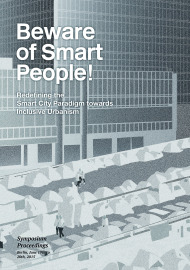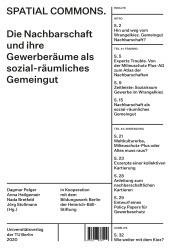Beware of smart people! Redefining the smart city paradigm towards inclusive urbanism
Proceedings of the 2015 “Beware of Smart People!” symposium
Editor: Andreas Brück, Sybille Frank, Angela Million, Philipp Misselwitz, Johanna Schlaack, Carolin Schröder, Konrad Wolf, Jörg Stollmann

Format: 21,0 x 29,7 cm
Publishing year: 2016
The Smart City paradigm aims at resource efficient urban development by means of ICT implementation. Cities where we work and conduct our research are building Smart City strategies and that research institutions increasingly fund research into the development of smart infrastructure and. Smart Cities are considered a radical paradigm shift and motors of technological innovation: economic growth, higher quality of life, efficiency and risk control in the face of shrinking resources and impending climate change. This smartification is contrasted by increasing calls by civil society and urban social movements for more encompassing inclusion in decision-making. New urban actors are acquiring agency through situated knowledge, local expertise, social networking, and cooperation and collaboration skills. Behind these movements a seemingly parallel discourse to the “Smart City” paradigm is gaining ground – the discourse of the commons. Commons are defined as the combination of resources, people and practices: resources which are defined and managed by a group of people – of commoners – and a practice of commoning that looks after, takes care for and fosters this resource without exhausting it. Commoning is a practice that seems closer than any other practice to a sustainable way of life. Are these two discourses – the discourse on the Smart City and the discourse on the urban commons – irreconcilable antagonists or do they share a common ground which needs to be uncovered, developed and advocated. This question is by no means merely theoretical. It is also a very practical question which pertains to the management and distribution of the resources we depend on. It is a very political question as it demands negotiation and the taking of sides. And it is an ethical question in that it relates to how we respect and stand up for each other – our fellow human beings and also the non-human nature for which we are responsible. The essays and transcripts of the symposium “Beware of Smart People!” want to make a first contribution and stimulate future research in the field.



